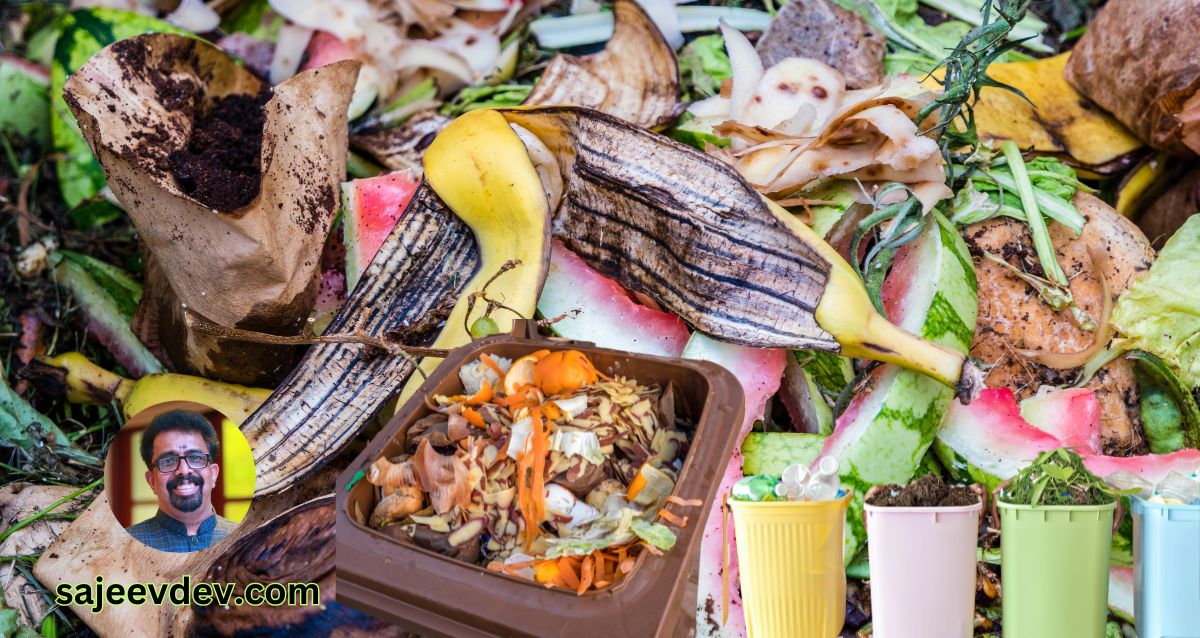What is Bio-Waste?
Bio-waste refers to any biodegradable material that originates from biological sources. This includes organic matter derived from both plants and animals, which can decompose naturally under suitable conditions. The increasing focus on sustainability and environmental preservation has brought bio-waste management to the forefront, emphasizing the need to understand its types and characteristics.
Bio-waste can be categorized into several types, each with distinct sources and implications for waste management. One major category is food waste, which consists of leftover food scraps, expired products, and peelings generated during the preparation and consumption of meals. This type not only presents challenges in terms of disposal but also poses significant environmental concerns if not managed appropriately.
Another key category is garden waste, which encompasses organic materials such as grass clippings, leaves, branches, and other plant remnants from landscaping activities. Garden waste contributes to the overall volume of bio-waste, especially in urban and suburban areas, where gardening and landscaping are prevalent.
Agricultural waste is another important category, arising from farming activities. This includes leftover crop residues, manure, and other by-products of agriculture that can be recycled or composted to return nutrients to the soil or generate energy.
Additionally, biodegradable packaging is considered bio-waste when it is made from organic materials such as starch, cellulose, or other renewable resources. This type of packaging is increasingly promoted as an alternative to non-degradable plastics. Lastly, contaminated paper and cardboard, which may include food wrappers or other organic matter, also falls under the bio-waste category. The common characteristic across these examples is their ability to decompose naturally, making them valuable resources for composting and energy recovery efforts.
Types of Bio-Waste
Bio-waste is a broad category that encompasses various organic materials originating from human activities. Understanding the different types of bio-waste is essential for effective management and sustainability practices.
One prominent form of bio-waste is food waste, which includes discarded food items, kitchen scraps, and spoiled groceries generated from households and food-related industries, such as restaurants and supermarkets. In residential settings, food waste may arise from both cooking and uneaten leftovers. In commercial establishments, significant amounts of food waste can occur during meal preparation, serving, and spoilage. Food waste management practices focus on reducing disposal through composting, donation, and recycling initiatives.
Another major category is garden waste, which originates from landscaping activities, residential gardening, or maintenance of parks and green spaces. This type of bio-waste includes grass clippings, branches, leaves, and other plant material. Proper management of garden waste is crucial to maintaining a sustainable environment, as it can be transformed into nutrient-rich compost or mulch. This process enriches soil quality and promotes healthy plant growth, reducing the need for chemical fertilizers.
Agricultural residues form an additional type of bio-waste, stemming from farming operations. This includes leftover crop materials, such as stalks, leaves, and roots, as well as byproducts from livestock farming. The effective management of agricultural residues is vital, as it can lead to sustainable practices, including soil amendment and bioenergy production. Utilizing these materials not only minimizes waste but also contributes to the circular economy in agriculture.
Furthermore, biodegradable packaging and paper materials also fall under the bio-waste category. These items, made from natural sources, can decompose safely over time, reducing the burden on landfills. Integrating biodegradable options into production and consumption patterns supports sustainable management of bio-waste and enhances environmental conservation efforts.
Sources of Bio-Waste
Bio-waste, a significant component of the global waste stream, originates from a variety of sources, each contributing to the overall quantities generated. Understanding these sources is essential for effective bio-waste management and promotes sustainability efforts.
Households are one of the primary contributors to bio-waste, generating substantial amounts from daily activities. Food remnants, such as fruit and vegetable scraps, leftover food, and organic packaging, constitute a considerable portion of household waste. According to estimates, homes generate approximately 50% of the total organic waste produced, highlighting the importance of implementing effective separation and composting practices.
Agricultural practices also play a vital role in the production of bio-waste. The agricultural sector generates large volumes of organic materials, including crop residues, animal manure, and food spoilage. For instance, a single hectare of cultivated land can yield tons of plant waste annually. This waste not only poses disposal challenges but also presents opportunities for nutrient recycling through methods like composting and anaerobic digestion, which can convert waste into energy and organic fertilizers.
Furthermore, the food processing industry is another significant source of bio-waste. During the manufacturing and preparation of various food products, by-products such as peelings, seeds, and expired products are generated. These by-products can account for up to 30% of total food processed, illustrating the scale at which this industry contributes to bio-waste. Efficient management practices in this sector can mitigate environmental impacts and promote sustainability through the recovery of resources from waste.
In conclusion, the major sources of bio-waste, including households, agriculture, and food processing, collectively produce significant volumes of organic material. Recognizing and managing these sources is crucial for effective bio-waste strategies, fostering sustainability, and minimizing environmental impact.
The Importance of Bio-Waste Management
Bio-waste management is a crucial aspect of sustainable waste management practices that significantly contributes to environmental preservation. One of the primary reasons for effective bio-waste management is its potential to reduce landfill waste. Landfills are burdened by a plethora of waste types, and when organic materials such as food scraps and garden waste are disposed of in these sites, they contribute to the accumulation of waste that can take years to decompose. By implementing proper bio-waste management strategies, we can significantly reduce the volume of waste entering landfills, ultimately leading to a decrease in environmental strain.
Moreover, the decomposition of organic matter in anaerobic conditions, commonly found in landfills, generates methane—a potent greenhouse gas that significantly contributes to climate change. By managing bio-waste effectively, we can greatly minimize methane emissions. This not only aids in combating global warming but also aligns with local and global sustainability initiatives aimed at fostering cleaner air and a healthier ecosystem.
In addition to reducing landfill waste and greenhouse gas emissions, bio-waste management can enhance soil fertility through practices such as composting. Composting transforms organic waste into nutrient-rich soil amendments, which can be used to enrich agricultural lands and gardens. This process not only diverts waste from landfills but also promotes healthier soils, leading to improved plant growth and increased food security.
Finally, bio-waste management opens avenues for energy production through various methods such as anaerobic digestion. This process can transform organic waste into biogas, which can serve as a renewable energy source. By harnessing the energy potential of bio-waste, communities can reduce reliance on fossil fuels, further advancing sustainability goals. Properly understanding and managing bio-waste not only addresses pressing environmental issues but also fosters a more sustainable future for all.
Environmental Impact of Improper Bio-Waste Disposal
Improper disposal of bio-waste poses significant threats to the environment, impacting not only air and water quality but also contributing to climate change. When bio-waste, such as food scraps and yard trimmings, decomposes anaerobically in landfills, it generates potent greenhouse gases, particularly methane. Methane is over 25 times more effective than carbon dioxide in trapping heat in the atmosphere over a 100-year period, making it a concerning factor in global warming. The increase in greenhouse gas emissions from bio-waste highlights the urgent need for effective waste management strategies.
Moreover, improper bio-waste disposal can also lead to soil and water pollution. When organic materials are not adequately managed, they can leach harmful substances into groundwater and surface water bodies. This contamination can disrupt aquatic ecosystems, leading to detrimental effects on fish and plant species. Additionally, it poses health risks to humans who depend on these water sources for drinking and agricultural purposes. The correlation between poor waste management and environmental degradation underscores the necessity for systematic approaches in handling bio-waste.
Furthermore, the impact extends to habitat destruction. As landfills expand to accommodate increasing volumes of waste, natural habitats are often cleared, displacing wildlife and reducing biodiversity. The loss of these ecosystems contributes to ecological imbalances, as each species plays a crucial role in its environment. This destruction also increases human-wildlife interactions, sometimes leading to conflicts, which may jeopardize community safety and local wildlife populations.
Addressing the environmental ramifications of improper bio-waste disposal is not just a challenge for waste management authorities but also a responsibility for individuals and communities. Implementing proper bio-waste management practices, such as composting and recycling, can significantly mitigate these negative effects. By adopting sustainable behaviors, everyone can contribute to a healthier environment and a more sustainable future.
Methods of Bio-Waste Management
Effective bio-waste management is crucial for enhancing sustainability and reducing environmental impact. Various methods have been developed for managing bio-waste, each with unique benefits and challenges. Understanding these methods can aid individuals and organizations in selecting the most appropriate strategies for their bio-waste disposal needs.
One of the most common methods is composting, a process that involves the decomposition of organic materials by microorganisms under controlled conditions. This method transforms bio-waste into nutrient-rich compost that can be used to enrich garden soil. Composting not only reduces the volume of waste sent to landfills but also recycles essential nutrients back into the ecosystem. However, composting requires careful maintenance to ensure the right balance of carbon and nitrogen, moisture, and aeration, which can be challenging for some users.
Anaerobic digestion is another effective method, where bio-waste is broken down by microorganisms in the absence of oxygen. This process produces biogas, a renewable energy source, and digestate, which can be used as a fertilizer. The advantages of anaerobic digestion include energy recovery and reduced greenhouse gas emissions. Nevertheless, it involves higher capital and operational costs, and the process requires specific conditions to be effective, which might limit its application in certain situations.
Recycling organic materials also plays a significant role in bio-waste management. This method includes converting various organic waste into new products or materials. The benefits here include resource recovery and reduced environmental burden, but efficiency can vary based on local recycling infrastructure.
Lastly, the use of bio-waste in landscaping and agriculture, such as utilizing organic mulch or biomass in soil amendments, promotes sustainability. However, challenges may arise concerning contamination and the aesthetic implications of certain bio-waste types. Each method of bio-waste management needs to be considered based on its unique context and resource availability for optimal results.
Benefits of Composting Bio-Waste
Composting bio-waste has emerged as one of the most effective methods for managing organic materials, offering numerous environmental and economic benefits. One of the primary advantages of composting is its ability to enrich the soil. When bio-waste decomposes in a controlled environment, it transforms into nutrient-rich compost that enhances soil structure, promotes healthier plant growth, and improves moisture retention. This process not only enriches the soil naturally, but it also reduces the need for chemical fertilizers, contributing to a more sustainable agricultural practice.
Furthermore, composting significantly reduces the volume of waste sent to landfills. When organic materials such as food scraps and yard waste are composted, they decompose naturally instead of contributing to the growing problem of landfill overflow. As organic waste in landfills decomposes anaerobically, it produces harmful greenhouse gases such as methane. By diverting bio-waste from landfills through composting, not only is the waste volume reduced, but we can also mitigate the release of these potent gases, thus positively impacting climate change.
Another vital component of composting is its role in creating a sustainable cycle for organic materials. This cycle not only reduces waste generation but also encourages a more circular economy where resources are reused rather than discarded. As compost enriches the soil, it fosters a healthier ecosystem that supports biodiversity. Moreover, by engaging in composting, communities can actively participate in sustainable practices that promote environmental stewardship and raise awareness about the importance of responsible waste management.
In conclusion, composting bio-waste is an effective strategy that offers significant benefits, including soil enrichment, reduction of landfill waste, and the establishment of a sustainable cycle for organic materials, making it a valuable practice for both individuals and communities alike.
Innovative Uses of Bio-Waste
Bio-waste, often regarded as an unutilized resource, holds significant potential for innovative applications that contribute to sustainability and energy solutions. One prominent use of bio-waste is its conversion to biogas, which serves as a renewable energy source. Anaerobic digestion is a process wherein organic materials, such as food scraps and agricultural residues, are decomposed by microorganisms in the absence of oxygen. This process generates biogas, which primarily consists of methane, and can be used for electricity generation, heating, or as a vehicle fuel. An exemplary case is the success of biogas plants in Germany, where thousands of farms have adopted this technology, significantly reducing waste disposal costs and carbon emissions while producing clean energy.
Another innovative use of bio-waste is its transformation into bio-based products. These products, derived from organic materials, can range from biodegradable plastics to biofuels. Innovative startups have emerged in this field, such as those converting agricultural waste into bio-based packaging materials. Such initiatives not only reduce dependency on fossil fuels but also contribute to a circular economy by utilizing what would otherwise be waste. For instance, various companies are now producing bioplastics from food waste, which helps in mitigating the environmental impact of traditional plastic production.
Bio-waste also plays a vital role in sustainable agriculture, where it can be applied directly as an organic fertilizer or compost. The decomposition of bio-waste enriches the soil with essential nutrients, improves its structure, and enhances its water retention capacity. An excellent illustration of this practice can be seen in community composting programs, where urban organic waste is transformed into nutrient-rich compost for local gardens and farms. This not only promotes waste reduction but also fosters local food production, thereby creating a more resilient food system.
These innovative applications of bio-waste underscore the necessity of viewing organic waste as a valuable resource. By harnessing bio-waste responsibly, we can contribute immensely to energy production, environmental sustainability, and agricultural productivity.
Call to Action
In summary, effective bio-waste management is a critical component of sustainability efforts that can significantly impact our environment. Throughout this guide, we have explored the definition of bio-waste, its types, and consequently, the importance of responsible management practices. By understanding the nature of bio-waste, individuals and communities can better appreciate the role that proper disposal and recycling play in minimizing environmental harm.
The first step towards impactful bio-waste management is composting. This method not only reduces waste sent to landfills, but it also enriches the soil, promoting healthier plant growth. By transforming kitchen scraps and yard waste into compost, individuals can contribute to a circular economy that prioritizes sustainability. It is a practical, hands-on approach that empowers individuals to make a positive change.
Additionally, proper disposal methods are vital. Encouraging the separation of bio-waste from non-biodegradable materials ensures that organic waste is processed effectively. Communities and municipalities can support this initiative by providing adequate infrastructure, such as compost bins and drop-off centers. Advocacy for better policies related to bio-waste management can lead to improved systems at a local and national level, fostering a culture that prioritizes sustainability.
As we reflect on the importance of managing bio-waste, let us consider our role in driving this change. Take the initiative to start composting at home, explore community resources, and engage in discussions about bio-waste policies. By doing so, we can collectively work towards a cleaner, healthier environment. Your actions can make a significant difference, contributing to a sustainable future for generations to come.







